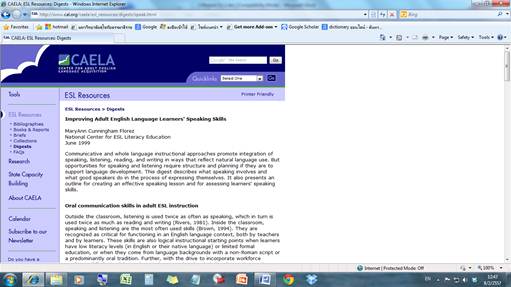Module 5: Developing Self-knowledge of ASEAN
Table of Contents
Language Focus
Language Focus 6: Pronunciation practice
To be able to communicate effectively, one must be able to speak understandably.
We can learn how to practice pronunciation by imitating the sound, studying the phonetics, paying attention to the lip movement of the speakers.
There are several ways to help you pronounce English words correctly (in standard English). You can log on to several websites to practice your pronunciation.
Language Focus 7: Strategies for developing listening and speaking skills
In order to communicate, we need to both listen and speak. To listen and get the message effectively, there are some strategies we need to pay attention to. To be able to verbally communicate, we need to be able to pronounce correctly (with some accents) and use the language correctly.
The first website gives some useful listening strategies.
Language Focus 8: What a good speaker does
The second website on speaking strategies
(Source: http://www.cal.org/caela/esl_resources/digests/speak.html retrieved 8/2/2014)
Language Focus 9: What a good speaker does
What a good speaker does
A speaker's skills and speech habits have an impact on the success of any exchange (Van Duzer, 1997). Speakers must be able to anticipate and then produce the expected patterns of specific discourse situations. They must also manage discrete elements such as turn-taking, rephrasing, providing feedback, or redirecting (Burns & Joyce, 1997). For example, a learner involved in the exchange with the salesperson described previously must know the usual pattern that such an interaction follows and access that knowledge as the exchange progresses. The learner must also choose the correct vocabulary to describe the item sought, rephrase or emphasize words to clarify the description if the clerk does not understand, and use appropriate facial expressions to indicate satisfaction or dissatisfaction with the service. Other skills and knowledge that instruction might address include the following:
- producing the sounds, stress patterns, rhythmic structures, and intonations of the language;
- using grammar structures accurately;
- assessing characteristics of the target audience, including shared knowledge or shared points of reference, status and power relations of participants, interest levels, or differences in perspectives;
- selecting vocabulary that is understandable and appropriate for the audience, the topic being discussed, and the setting in which the speech act occurs;
- applying strategies to enhance comprehensibility, such as emphasizing key words, rephrasing, or checking for listener comprehension;
- using gestures or body language; and
- paying attention to the success of the interaction and adjusting components of speech such as vocabulary, rate of speech, and complexity of grammar structures to maximize listener comprehension and involvement (Brown, 1994).
Teachers should monitor learners' speech production to determine what skills and knowledge they already have and what areas need development. Bailey and Savage's New Ways in Teaching Speaking (1994), and Lewis's New Ways in Teaching Adults (1997) offer suggestions for activities that can address different skills.
